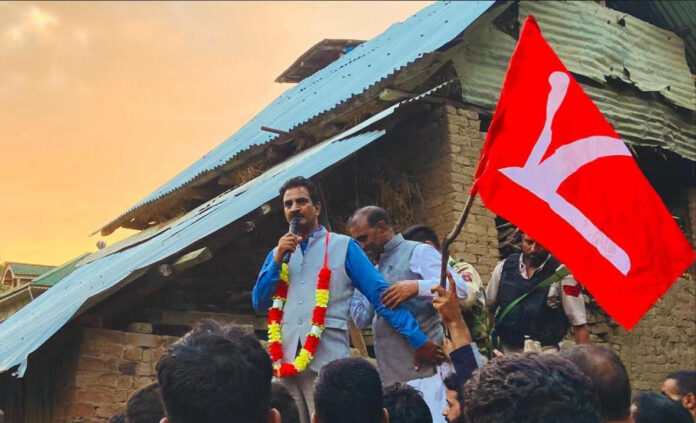
Tauseef Ahmed and Mohammad Aatif Ammad Kanth, TwoCircles.net
Gurez: Celebrations erupted outside the residence of National Conference (NC) candidate Nizar Ahmed Khan, who triumphed over Faqeer Mohammad Khan of the Bharatiya Janata Party (BJP) by over 1,100 votes after five rounds of counting. Alongside Shopian, Gurez was a key constituency where the BJP harbored high hopes – bolstered by Defense Minister Rajnath Singh’s campaigning for his party’s candidate. The saffron party viewed Gurez as one of two pivotal seats to secure a historic win and establish a presence in the Valley.
However, after a close contest, they fell short. This loss was particularly noteworthy since Gurez is reserved for Scheduled Tribes (STs), and the BJP had recently expanded the ST category to include over 10 communities – increasing the reservation from 10% to 20% in government jobs. Despite these efforts, the party failed to win any ST seats in Kashmir.
Nizar expressed gratitude to the public, stating that his victory represented not only a personal achievement but also a defeat for the BJP and Prime Minister Narendra Modi, who had invested millions in the campaign. He highlighted the BJP’s “propaganda” against him and “personal attacks” but noted that the voters responded decisively. “The people are the best judges and have absolute power to bring anyone down on the day,” emphasising that the mandate sent a strong message to the BJP about their lack of relevance in Gurez.
As the NC registered a landslide victory in the region, it also gained ground in Jammu. The BJP, which initially anticipated winning over 35 seats in the Union Territory, faced a setback by winning only 29 seats that too all from Jammu region.
Another significant blow to the BJP was the loss of Nowshera seat by J&K Party President Ravinder Raina to NC candidate Surinder Kumar Choudhary. Raina, who had previously claimed that the BJP would easily form a government in the erstwhile state with like-minded allies, suffered an unexpected defeat – marking a major shock for the party. Last time, he had won the seat by nearly 10,000 votes.
This election carries substantial weight for both national and regional parties, with top leaders and officials actively campaigning. BJP’s star campaigners included Prime Minister Narendra Modi, Home Minister Amit Shah and Defense Minister Rajnath Singh, while Rahul Gandhi, Priyanka Gandhi and Mallikarjun Kharge campaigned for the Indian National Congress. Youth leader Kanhaiya Kumar also campaigned for Congress candidates in the region.
The election is particularly significant as it marks the first assembly polls in Jammu and Kashmir since the abrogation of Articles 370 and 35A. Eager to demonstrate control over the region and showcase public satisfaction with the abrogation, the BJP faced an unexpected setback as the results turned unfavorable.
Nayeema Mehjoor, a senior journalist with over three decades of experience covering politics of the region, attributed the election results to a “referendum” against the abrogation of Articles 370 and 35A and a rejection of the BJP. She stated, “The people of J&K have outrightly rejected the BJP and its Kashmir policy. This is a humiliation for them.”
Notably, she pointed out that not only Kashmiris but also voters from Jammu supported a party campaigning for restoring Article 370 and statehood, signaling that the BJP’s claims of J&K’s satisfaction with the abrogation were false.
Mehjoor emphasised the significance of Ravinder Raina’s defeat, describing it as a clear message to the BJP, which had projected him as a leading figure.
Post-abrogation of Articles 370 and 35A, the BJP implemented significant changes in the region, including delimiting seats to add five in Hindu-majority areas, granting the LG the power to nominate five seats and reserving seats for Scheduled Tribes. However, these efforts have largely failed.
Riyaz Ahmed Khan, the winning candidate from Shangus, commented on the NC’s victory and the BJP’s failure, describing the result as a “strong expression of public resentment against the BJP and its policies in J&K”.
Expressing gratitude to the union territory’s people, Khan stated, “The people have decided to give the mandate to the party that has tirelessly worked for them over the years.”
He noted that the BJP’s tactic of empowering the LG to nominate five seats was clearly aimed at securing their position, adding, “These five seats, selected by the LG, were only meant to serve the BJP’s interests and bring them into power.”
Despite this, Khan was confident that the BJP would fall short and fail to form a government in J&K, especially after the abrogation of Article 370. He assured the public that if the NC comes into power, they would focus on resolving public issues “within the limited powers” granted to them.
With a total of 95 assembly seats and 48 needed to form a government, it always seemed unlikely that any single party will secure a majority. By securing 49 seats The India alliance between INC, the National Conference and CPI(M) is expected to form the government with barest of margins. The BJP, despite potentially benefiting from five nominated seats, is still far from a majority.
Although there were apprehensions of the hung assembly before results, the India alliance made it through with NC taking the huge lead by coming up with 42 seats however questions are emerging about the INC’s performance with just six wins, highlighting an imbalance within the alliance.

